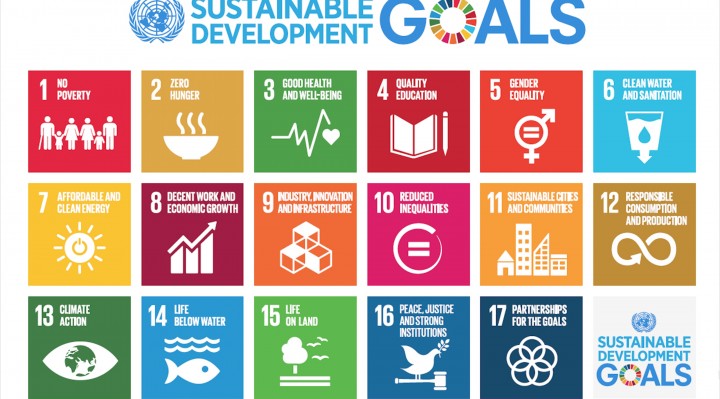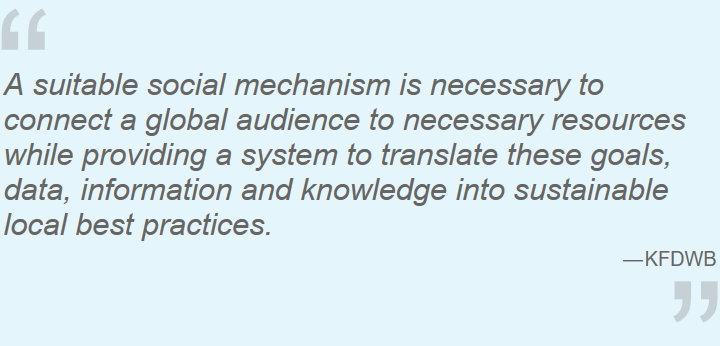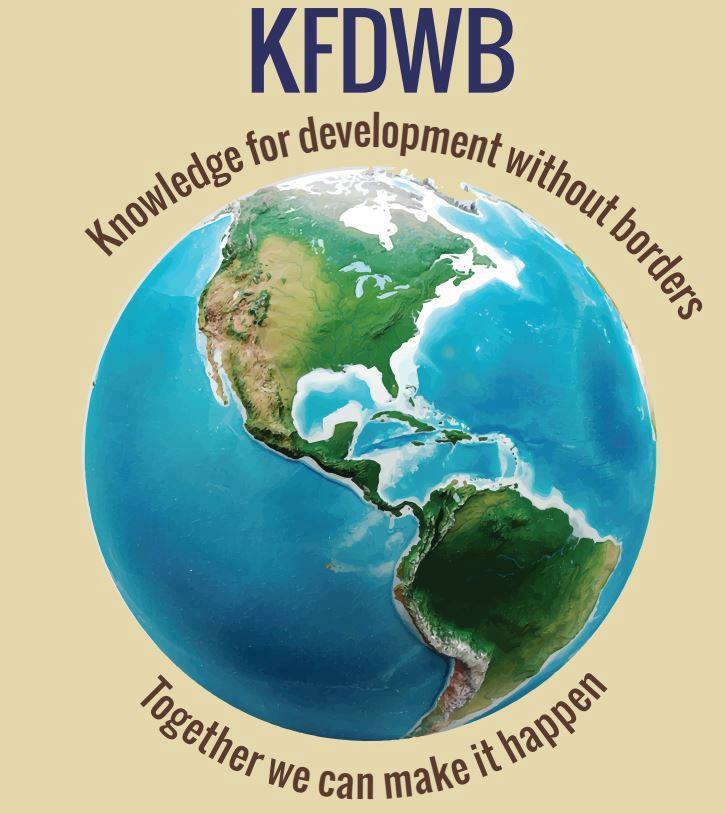
We are collecting data on current development situations on the ground. Consequently, we are writing reports / development of case studies / on local development issues and challenges available online to development organizations and responsible local and national bodies in order to improve targeted development interventions. The following graphic describes how it works.

To let the wider audience know about your community’s current developmental needs, please fill out the form below. Please note: Any report must be locally assessed before it can be included in our database, and we do not encourage or support any political reporting. The form does not require you to fill in your name (you can be anonymous in our database), however, it does require you to share an email address in order to contact you for the next level.
…No one sould be left behind / No one could ever do it right at your place as local community members…
Thank you to all those who contributed to the collection of information for the sustainable development of their locality. This is an exceptional opportunity for everyone to express themselves directly, or by anonymity on hot topics to the development of their locality. When you have sustainable development troubles at your place and you do not cry for help, no one came to your rescue..It’s an opportunity to do it below in different languages.
Home / live Visualization of the information we are collecting
Timestamp | Titel | Full Name | Organisation / NGO | Country | Development Area | Country, Village, Settlement, Town or City | Development Issue Identified (max 400 words) | Email | Has the Report Been Assessed Locally? | Number of Population Affected | Education level of the concerned populations | Local capacity level of the concerned populations | Supporting Evidence (link, video or foto) | Main Problem | Please provide the name(s) of donor organisations involved | Name of Responsible Authorities on a local level | Name of Responsible Authorities on a District level | Name of Responsible Authorities on a National level | Can you provide a Development Case Study (DSC) of the situation? | Website Address | Development Area | |
|---|---|---|---|---|---|---|---|---|---|---|---|---|---|---|---|---|---|---|---|---|---|---|
| Mr | Galfato Gabiso Gada | Hawassa University | Ethiopia | Agriculture & Rural Development | Farra kebele, Tabor sub city, Hawassa city Adiminstration | Farmers loose their product value because of low value chain functioning. more problem related with crop sells in their field because of they are lack of clothes and refund borrowed money. to that giving credit service during harvesting and collecting grain at harvesting to sell after good price for it may change life and food security problem of small scale farmers of Technology villages of Hawassa University. | galfatogabiso@gmail.com | Yes | >1000 | Middle e.g. Some of the populations in the village go to school | Fair: some action, some guidance, some engagement or some mobilization | no any related to this point | Little or no engagement by donor agencies / IFIs | Goal Ethiopia | District Agriculture Office | Minja Hayesso | Tefera Derbew | Yes | http://www.hu.edu.et | |||
| Mr | mbegera jezreel | Kenya | Agriculture & Rural Development | Tala Kangundo-Machakos | Food insecurity in Tala Kangundo-Machakos County in Kenya and adjacent areas due to lack of sufficient trainings to farmer groups,poor quality of seeds,Inadequate rainfall coupled with Poor farming techniques and inadequate quality and quantity of arable land leading to low production of food to sustain the community | galfatogabiso@gmail.com | No | 100 - 1000 | Low e.g. None of the populations in the village go to school | Fair: some action, some guidance, some engagement or some mobilization | Lack of Guidance | not specified | local government | NO | ||||||||
| Mr | John Waweru Gakunga | Interwaste R&D (EA) Trust | Kenya | Education | Nairobi | Interwaste R&D (EA) Trust programme projects will promte waste resources recovery education in universities in great lakes region; facilitate rural/ urban water, sanitation, and hygiene initiative in the region; climate change issues, solutions and campaigns in the region;infrastrusture/ facilities in the region including real estate; waste to energy for sustainable developments in cities in the region.Also facilitating research and developments activities in the areas listed above. Thank you. Best regards John Waweru Gakunga Founder and Managing Trustee Interwaste R&D(EA) Trust P:+254 (0) 720549340 E:jwgakunga@gmail.com Website:www.interwaste-ea.co.ke | galfatogabiso@gmail.com | No | >1000 | Middle e.g. Some of the populations in the village go to school | Fair: some action, some guidance, some engagement or some mobilization | No supporting evidence like feasibility study etc | Little or no engagement by donor agencies / IFIs | None | Interwaste/UNEP Africa Office | Interwaste/UNEP Africa Office | Interwaste has a backing of Kenya Investment Authority, National Environment Management Authority and National Land Commission | NO | http://www.interwaste-ea,co,ke | |||
| Mr | Paul GBALENE | ASSID | Cameroon | Agriculture & Rural Development | Djomedjoh, Lomié | Poor population in an remote area without access to water and basic sanitation infrastructures. Difficut to access modern market, non transformation of forest and agriculture products. No effective value chain developped despite abundant natural resources. Indigenous people (pygmies) not involved in development activities and suffering of hunger and poverty. | galfatogabiso@gmail.com | Yes | 100 - 1000 | Middle e.g. Some of the populations in the village go to school | Weak: no action, no guidance, no engagement or no mobilization | Insufficient mobilization of funds | Lomié municipality | Valère Akpakoua | Leopold Sedar Zamgbowa | Paul Gbalène | NO | |||||
| Mr | Desmond Lee Nkosinathi | Swaziland Association for Crime Prevention and the Rehabilitation of Offenders (SACRO) | Swaziland | Social Development | Village, Town | Newly release ex offenders find themselves with no option but to return to prisons due to lack of facilities to help them reintegrate back into their communities as useful citizens. SACRO has 40 workshops for leasing out to rehabilitated offenders mainly women and youth. We need equipment they can use that will ensure they put into practise that which they learnt during incarceration. We also realize that the officials doing the rehabilitation need trauma therapy but none is availed in the country hence this results in domestic violence. There is also the issue of orphans who have ended up in the streets which we try and reconcile with their families after they have suffered abuse either from step parents or relatives of a parent(s) who may have died due to the scourge of Aids which hit the country in a big way. We also need funding to advocate for a fairer criminal justice system in line with the UN Minimum Rules in line with international obligations which the country committed to. | galfatogabiso@gmail.com | No | >1000 | Middle e.g. Some of the populations in the village go to school | Weak: no action, no guidance, no engagement or no mobilization | http://www.sacro-sd.com | Little or no engagement by donor agencies / IFIs | Swaziland Government UNICEF | Desmond Maphanga - Director SACRO | Regional Administrators Prince Gcokoma | Commissioner General His Majesty's Correctional Services and the Deputy Prime Ministers Office | Yes | http://www.sacro-sd.com | |||
| Miss | Judith Nalumansi | Mukono Lifecare Development Coalition | Uganda | Labor & Social Protection | Mukono | Founded in 2012 as a non-governmental organization, Mukono Lifecare Development Coalition (MLDC) involved in networking, collaborating and implementing capacity building programs with various organizations, local and national authorities, local and central governments in Uganda at the grassroots. MLDC is an umbrella of over 70 CBOs, NGOs and farmers' co-operatives now in Mukono District, going national next year. For the past two weeks, MLDC team has been reaching communities through CBOs and NGOs to monitor and evaluate their activities, considering the transparency and accountability process, where the central and local governments have been supporting to ensure proper service delivery at the grassroots levels. The findings will be compiled starting 22/12/2014, and reports are to be submitted to all concerned bodies including the governments. This is a voluntary services initiated by the Director MLDC, to find out how these community based organizations and co-operatives in villages have been performing, since they were registered, what support they have received or not, and why not?, where the support is needed. This has been done through cross-exchange of ideas, knowledge and resources, questionnaires and interviews to their leaders, local leaders and community members. Exercise is ended 21/12/2014. Findings are that, these groups/community development organizations are their but some not functional, some operational but financially incapacitated, not because the government does support their ideas but due to corrupt leadership at national and local levels the services don't reach them. Some yes, since their founding, they haven't received any support be it material or financial, however though resources are limited. Full report will be generated by MLDC team later ..... | galfatogabiso@gmail.com | No | >1000 | Middle e.g. Some of the populations in the village go to school | Fair: some action, some guidance, some engagement or some mobilization | Lack of Action | Self-help project initiated by Mukono Lifecare Development Coalition volunteers team. | Community Development Officers, Mukono District, Local Councils | Chief Administrative Officer, Government Inspection Security Officers, RDC | Central Government, Policy makers and practitioners | Yes | |||||
| Mr | RUKUNDO Dieudonné | Association pour lutter contre les violences domestiques ALUVD en sigle | Burundi | Urban Development | NGOZI | L’étude est basée sur l’analyse de données existantes et sur une série d’entretiens réalisés avec toutes les partiesprenantes, y compris les communautés locales et les institutions, la société civile, le secteur privé, les partenaires au développement, les universitaires, etc. Cette consultation se conclue généralement par une convention collective sur un certain nombre de priorités identifiées et leur intégration dans le renforcement des capacités proposées, ainsi que sur d’autres projets qui ambitionnent tous de réduire la pauvreté urbaine. Plus de 80% de la population burundaise vivent en milieu rural ou leurs maisons sont couvert de pailles. Elle est dispersée dans le milieu de colline. Mon objectif est l'installer dans les villages pour faciliter l'identification des problèmes qui se manifestent dans les ménages comme l'activité principale de notre organisation ALUVD en sigle | galfatogabiso@gmail.com | Yes | 100 - 1000 | Middle e.g. Some of the populations in the village go to school | Weak: no action, no guidance, no engagement or no mobilization | Insufficient mobilization of funds | UNhabitat | NIYONZIMA Egide | Yes | |||||||
| Mr | Herman Kizito | Africa Intercultural Development Support Trust | Uganda | Agriculture & Rural Development | Mukono | After having received training in India on Agriculture / Agribusiness and Sustainability on Eradicating Poverty in Rural Areas; we want to train as well as carryout community capacity building for young people aged 18 - 35 years to like agriculture and take it as a sustainable way of creating income and living. AIDEST is requesting for Aid to support her establish a technical training centre to help young people become self-sustaining. We are currently running a life-skills training centre for the youth, targeting the unemployed, less skilled, school dropouts, orphans and ongoing students. Africa Intercultural Development Support Trust (AIDEST) is a youth-led organization with a mission to give underprivileged Ugandan youth a chance for a better future by providing practical training and consecutive career guidance and improve their livelihoods. Youth cover nearly 71% of whom are unemployed due to lack of practical skills to become self-reliant. So AIDEST will continue covering this gap by empowering them with skills that they can reduce poverty among themselves in their home areas. | galfatogabiso@gmail.com | Yes | 100 - 1000 | Middle e.g. Some of the populations in the village go to school | Good: Previous action, guidance, engagement and mobilization | https://www.facebook.com/pages/AIDEST/479416342129137?ref=hl | Little or no engagement by donor agencies / IFIs | One time grant from onepercentclub in the Netherlands in conjunction with Accenture and Elsevier. Small grant expected from the Government of Uganda around January ending, to boost our activities. | Local Councils | Community Development Officer | NGO Forum, Government, Stakeholders | Yes | http://www.aidest.org | |||
| Mr | PATRICE OWUOR ADIKA | Orphans home of grace | KENYA | Education | Milimani estates,kakamega town | We have been in existence as a charity home for orphans and vulnerable children since 1999.We started with 7 fatherless children of whom three girls have completed their education from primary,secondary to colleges and two working at the moment while one is graduating january 2015.Two boys are in universities while one is in college.The other boy passed away.In total we have 33 orphans at the moment.We rely upon willing individuals to assist with food,education grants and clothing. We own a property but being faced with big challenges of continue support to enable the continuation of supporting the orphans. | galfatogabiso@gmail.com | Yes | <100 | Middle e.g. Some of the populations in the village go to school | Fair: some action, some guidance, some engagement or some mobilization | can send photos on request after reading our report | Insufficient mobilization of funds | Asian communities in Kakamega,few individuals in Australia | chief | COUNTY CHILDREN DEPARTMENT | C.C.I Nairobi | Yes | N/A | |||
| Mr | Modibbo Amadou Aboubakary | LEAD Cameroon | Cameroon | Environment | Yaounde | Reforetation project in the North of Cameroon. LEAD Cameroon is an association morphing to NGO with the main objective to emerge a new breed of leaders versed with the stakes of environment and sustainable development.LEAD Cameroon helps implement the agenda of LEAD International,an NGO based in London and doing with sustaible development issues. In a nutshell,our main activity is to recruit early and mid-career professionals from Government,Private sector and Civil Society organizations and train them in leadership skills and sustainable development topics that will help them to drive change in their communities. | galfatogabiso@gmail.com | Yes | >1000 | Middle e.g. Some of the populations in the village go to school | Fair: some action, some guidance, some engagement or some mobilization | Little or no engagement by donor agencies / IFIs | Ministry of Forestry and Wildlife | Minister of Forestry and Wildlife | Yes |

KFDWB Regional Academy Proposal

